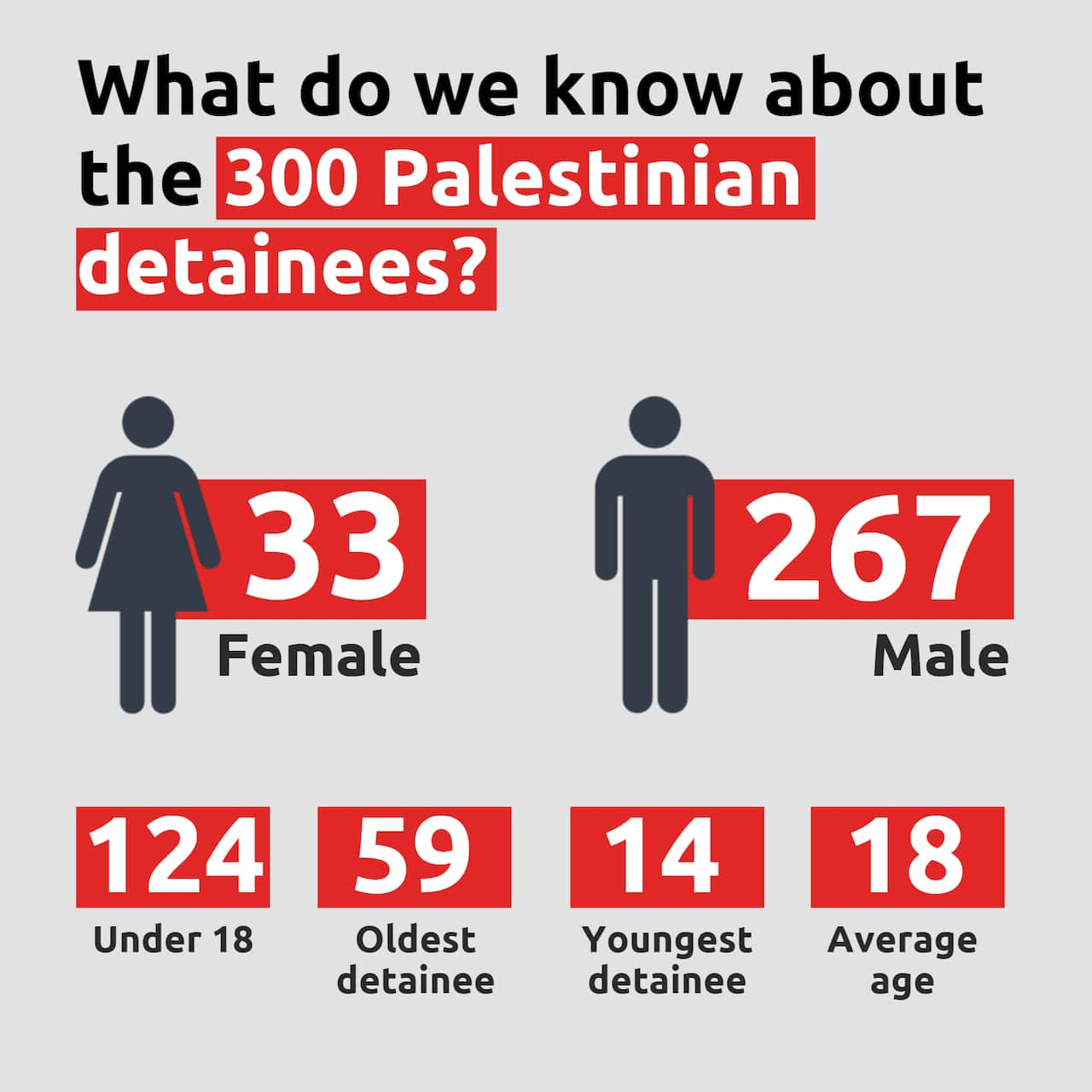Key Points
- Both Israeli women and children and Palestinian women and children will be released as part of the deal.
- Almost half of the Palestinians detained are women and children, with some as young as 14-years-old.
- Israel has faced criticism for its treatment of minors in detention.
Dozens of Palestinian parents are in disbelief at the potential return of their children via a hostage-for-prisoner .
The deal will see 150 Palestinian prisoners held in Israeli jails, predominantly women and children, released in exchange for 50 women and children of the estimated 240 abducted by Hamas militants .
One Palestinian mother from Beit Safafa, a Palestinian town near Jerusalem, was struggling to put her feelings into words after her daughter Malak's name appeared on the list.
"I'm nervous and worried, I don't know how to describe my feelings," Faatina Salman told AFP. Her daughter was 16 when she was arrested on her way to school for trying to stab a policeman in Jerusalem.
"I'm afraid that something will happen to the deal, and at the same time I can't believe I'll be able to hold, hug her after eight years in prison," she said, of her daughter who is now 23.
The Israeli government on Wednesday published a list of 300 Palestinian prisoners for possible release, with a second phase anticipated if more Israeli hostages are let go.
So what do we know about the Palestinians detained in Israeli prisons?
More than half the people on the list are women and children
Of the 300 Palestinians on the list for potential release, 33 detainees are adult women and 124 are children under the age of 18. Five of them are 14-year-olds, arrested in the last six months.
Many have been held under administrative detention, meaning Israel held them without trial.
The list includes the offences they were jailed for, including attempted stabbings, throwing stones at Israeli soldiers or having contacts with hostile organisations.

Based on a list of prisoners released by the Israeli government on Wednesday.
In that deal, Israel released more than 1,000 prisoners, some convicted of murder, including Yahya Sinwar, the Hamas leader in the Gaza Strip and one of those held responsible by Israel for the 7 October attack in which 1,200 Israelis were killed, including an estimated 30 children, and the hostages taken.
The length of the list suggested Israel was preparing for the possible disqualification of some prisoners by its Supreme Court, where victims of Palestinian attacks can file challenges, or that future prisoner-for-hostage swaps were being prepared.
Hamas is a Palestinian military and political group that has gained power in the Gaza Strip since winning legislative elections there in 2006.
Its stated aim is to establish a Palestinian state, while refusing to recognise Israel’s right to exist.
Hamas, in its entirety, is designated as a terrorist organisation by countries including Australia, Canada, the UK and the US while New Zealand and Paraguay list only its military wing as a terrorist group.
Other countries voted against a UN resolution condemning Hamas in its entirety, as a terrorist organisation.
Allegations of abuse of children in detention
Israel has faced ongoing criticism for the treatment of minors in detention.
A July report by broke down the abuse of Palestinian children imprisoned by Israeli officers, based on a sample of 228 children detained in the last three years.
It revealed 43 per cent of children suffered injuries during arrest, including gunshot wounds and broken bones, while over 90 per cent reported being blindfolded during their arrest.
Once imprisoned, 69 per cent reported being strip-searched during interrogation, with some reporting sexual violence or abuse, and 60 per cent experienced solitary confinement varying from 24 hours to 48 days.
In a 2022 submission to the United Nations, Human Rights Watch also found that Israeli security forces routinely interrogate children without a guardian, use unnecessary force during arrest and physically abuse children in custody.
Defence for Children International-Palestine estimates that an average of 500-700 children are detained by Israeli forces every year.
However, the number of detainees has risen since 7 October as Israel has conducted retaliatory assaults on the blockaded and densely populated enclave of Gaza, killing 14,000 people, including more than 5,000 children according to Gaza's health ministry.
Palestinian officials claim Israel has conducted mass arrests in the West Bank and East Jerusalem and that prisoners were increasingly facing physical assaults and humiliating treatment in Israeli detention facilities.
"Israel today is in the mood of revenge," Ramallah-based Palestinian Prime Minister Mohammad Shtayyeh told Reuters.

Israeli authorities have defended mass arrests throughout the West Bank, as they target members of the resistance movement Hamas. Source: AAP / SOPA Images/Sipa USA
The Israeli military has said it operates in the West Bank against suspects involved in militant activity and that more than 1,700 Palestinians recently arrested were associated with Hamas.
A statement by the Israel Prison Service said that "as part of the war effort" it was imposing tougher imprisonment conditions for Palestinian political prisoners.
What is the deal and will more hostages be released?
Israel has , the entry of aid to Gaza and the release of 150 Palestinian prisoners in return for the hostages, all children or women.
Another 150 Palestinian prisoners could be freed in return for another 50 hostages in days to come, a Palestinian official said.
"The release of a number of our prisoners during the war is a very important thing," said Qadura Fares, head of the Palestinian Authority's Commission for Prisoners' Affairs.
"This deal could be a start to change the general atmosphere of this war."
- With additional reporting by Reuters and AFP.



